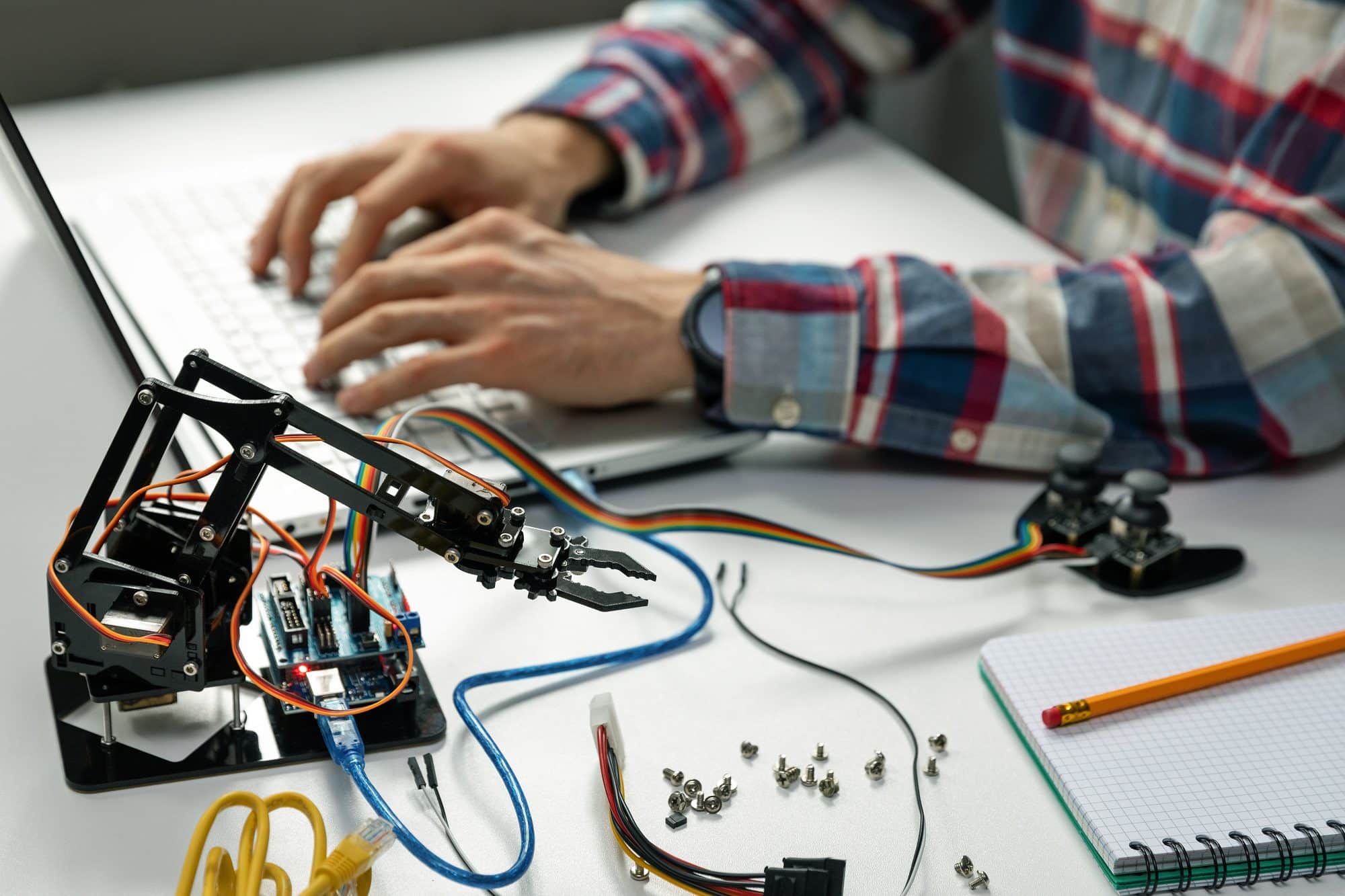From mechanics to electronics and programming, the robotics engineer is above all versatile. With Cédric Vasseur*, expert and trainer in AI and robotics, we attempt to sketch out their profile.

Because it calls on several areas of expertise, robotics can hardly be summed up in just a few skills. For Cédric Vasseur, who has been involved in a variety of robotics and artificial intelligence projects for over twenty years, a first approach would be to distinguish between 'hardware' and 'software'. "On the one hand, we have the industrial professions, which will work on machining parts, and on the other, the professions of the software environment and artificial intelligence".
How, then, do you identify the role of the robotics engineer, whose skills seem to cover both aspects of robotics?
What are the tasks of a robotics engineer?
In reality, several profiles can be found under the label "robotics engineer".. We could simply summarise the role of a robotic engineer as the design, programming and maintenance of robots and robotic systems... but this is a very broad definition. Few 'roboticists' can claim to be involved at every stage of a project. According to Cédric Vasseur, this generalist aspect of the profession can be explained, at least in France, by the diversity of robotics requirements : "In the field of robotics, everything depends on the objectives. Some engineers will have to work with robots, while others will be involved upstream, in their design. "
From the design of an industrial robot - a sophisticated process that requires years of involvement - to reception or maintenance robots, not forgetting robotic equipment for the healthcare sector, there is at least one thing in common: "A robotics project doesn't just involve one person, but usually a fairly large team.
The main mission of a robotics engineer will therefore depend on his or her specialisationThey are involved in the design of the robot, its electronic system and its automation. At the design stage, they use the specifications to define the tasks to be carried out. But also the technological solutions to be used, depending on the specific features of the project. As Cédric Vasseur explainsA specification for an industrial project includes an analysis of requirements and feasibility, as well as maintenance and maintainability, not to mention safety. But every project is different. While an engineer takes part in the development of the robotic system and the validation tests, he or she may also have a role to play right through to the adjustment operations.
In which sectors?
Given its countless possibilities, robotics continues to develop in a wide range of applications. For Cédric Vasseur, "the question is not so much to know which fields are concerned by robotics... as to find some that are not".. In France, where projects are gradually gaining in boldness, the profile of the robotics engineer is in high demand. Whether in the construction or aeronautics sectors, in the automotive industry and autonomous cars, in cobotics in industrial environments... or in the development of robotic surgeons for the healthcare sector.
Finally, In practice, roboticists can have very different profiles. They can work in a laboratory or in a workshop.. "Research laboratories do not have the same ambitions as industrialists; there is no obligation to achieve results in research. There's no obligation to achieve results in research, whereas a manufacturer's objective is to produce something concrete. That said, most manufacturers have a research laboratory...".
What skills?
As you can see, versatility is key in the robotics industry. "Robotics engineers necessarily specialise in one or more fields".says Cédric Vasseur, while admitting that a certain number of technical skills remain essential... starting with IT.
"The level of programming skills required, and the programming languages to be mastered, depend on the project. But the language you can't do without in robotics and AI today is Python. "The trainer also mentions C and C++, so-called "low-level" languages linked to performance, and even assembly language to work on the "hardware" part: "It is a complex language that is difficult to learn, and its use will therefore only be required in very specific situations. " Nevertheless, robotics engineers must have a solid background in programming.
But that's not all! Among the engineer's main skills, Cédric Vasseur also mentions mathematics, mechanics and electronics, as well as project management and UML in software engineering methodology. And then, perhaps more surprisingly, design and UX. Indeed, they "They can also play an important role in the construction of a robot.
What qualities?
Motivation is therefore required, but according to Cédric Vasseur, "People who go into robotics are generally passionate about it". And the sector, which is undergoing rapid change, remains attractive despite the complexity of some projects, which require both rigour and creativity.. “ To work in robotics, you need to be patient and able to see the short, medium and long term. Often, it's as important to be highly organised as it is to think outside the box - especially in research. He added that roboticists can come from very different backgrounds From engineering school graduates to seasoned developers, and even designers who are retraining, the diversity of our workforce can only benefit robotics!


